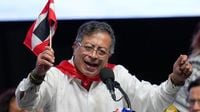In a dramatic escalation of diplomatic tensions, President Donald Trump announced on October 19, 2025, that the United States would immediately slash all funding to Colombia, citing what he described as President Gustavo Petro’s failure to curb drug production in the South American nation. The move, delivered in a series of pointed posts on Trump’s Truth Social platform from his Mar-a-Lago resort in Florida, has sent shockwaves through diplomatic, security, and human rights circles across the Americas.
Trump did not mince words. He branded Petro—Colombia’s first leftist president—an “illegal drug leader” and “low rated and very unpopular.” In one of his most forceful statements yet, he warned, “Petro better close up drug operations or the United States will close them up for him, and it won’t be done nicely.” Trump further accused Petro of “strongly encouraging the massive production of drugs, in big and small fields” throughout Colombia, according to AP and Al Jazeera.
“AS OF TODAY, THESE PAYMENTS, OR ANY OTHER FORM OF PAYMENT, OR SUBSIDIES, WILL NO LONGER BE MADE TO COLOMBIA,” Trump wrote, his message punctuated by capital letters for emphasis. He argued that U.S. assistance had become “nothing more than a long term rip off of America.” The decision, which follows years of fluctuating U.S. aid—down to about $230 million in the last fiscal year from highs over $700 million—marks a significant break in the longstanding partnership between Washington and Bogotá, as reported by AP and Al Jazeera.
Colombian officials responded swiftly and forcefully. The Foreign Ministry condemned Trump’s remarks as “a direct threat to national sovereignty by proposing an illegal intervention in Colombian territory.” In a statement, the ministry declared, “These accusations represent an extremely serious act and undermine the dignity of the president of Colombians.” The government vowed to seek international support in defense of President Petro and Colombia’s autonomy, according to Al Jazeera.
President Petro himself, known for his vocal presence on social media, rejected Trump’s allegations. “Trying to promote peace in Colombia is not being a drug trafficker,” Petro wrote. He described himself as “the main enemy” of drugs in Colombia and accused Trump of being “rude and ignorant toward Colombia.” Petro further suggested that Trump was being deceived by his advisers, as reported by AP.
The diplomatic spat comes against a backdrop of escalating U.S. military action in the Caribbean and growing violence in Colombia’s rural regions. On October 17, U.S. Defense Secretary Pete Hegseth announced that the Pentagon had attacked and destroyed a vessel associated with the National Liberation Army (ELN), a Colombian rebel group. Hegseth claimed the ship was involved in narcotics smuggling and that three people were killed in the strike, though he provided no evidence to support the assertion, according to Al Jazeera and AP.
These strikes are part of a broader campaign: since early September, there have been at least seven U.S. strikes in the region, targeting what the Trump administration describes as drug traffickers. According to AP, these operations have resulted in at least 32 deaths. The U.S. has also repatriated survivors of the attacks to Colombia and Ecuador. One Colombian survivor is facing prosecution for allegedly transporting a boat full of cocaine, even though the incident occurred in international waters. Ecuadorian authorities, meanwhile, found no evidence of criminal conduct by their national and declined to press charges.
The most controversial incident occurred on September 16, when a U.S. strike killed a Colombian man named Alejandro Carranza, identified by Petro as a fisherman from Santa Marta with no ties to drug trafficking. Petro asserted that Carranza’s boat was malfunctioning and adrift, with a distress signal activated, when it was struck. “U.S. government officials have committed murder and violated our sovereignty in territorial waters,” Petro wrote on X (formerly Twitter). “The Colombian boat was adrift and had a distress signal on, with one engine up. We await explanations from the US government.” He called for immediate legal proceedings internationally and in U.S. courts, continuing to post messages decrying the killing: “The United States has invaded our national territory, fired a missile to kill a humble fisherman, and destroyed his family, his children. This is Bolívar’s homeland, and they are murdering his children with bombs.” (AP, Al Jazeera)
Human rights groups and legal experts have also voiced alarm. Amnesty International described the U.S. military actions as “murder on the high seas,” and legal scholars have questioned the justification for such strikes under international law. The Colombian government’s plan to prosecute the survivor of a U.S. strike on a submersible allegedly carrying drugs has further fueled debate about sovereignty, justice, and due process.
The relationship between the U.S. and Colombia has grown increasingly fraught since Trump returned to office. Last month, the U.S. State Department revoked Petro’s visa after he joined a pro-Palestinian demonstration in New York and called on American soldiers to disobey Trump’s orders. “I ask all the soldiers of the United States’ army, don’t point your rifles against humanity” and “disobey the orders of Trump,” Petro said, according to Al Jazeera.
Colombia remains the world’s largest exporter of cocaine, with coca leaf cultivation reaching an all-time high in 2024, according to the United Nations. Despite Petro’s pledge to tame coca-growing regions through social and military intervention, progress has been limited, and violence persists in rural areas where the government has struggled to assert control since a peace deal with insurgents a decade ago.
Elizabeth Dickinson, a senior analyst for the Andes region at International Crisis Group, told AP, “It is befuddling and profoundly unwise of the United States to alienate its strongest military partner in Latin America at a moment when tension between Washington and Venezuela are at its highest point in recent years.” She warned that further U.S. aid cuts could undermine Colombia’s military and police just as they face “the greatest security crisis in Colombia for over a decade.”
Meanwhile, the Colombian Foreign Ministry has vowed to pursue diplomatic channels to defend its sovereignty, and the fallout from Trump’s announcement is already being felt in both capitals. As the two countries navigate this new era of confrontation and diminished cooperation, the fate of anti-narcotics efforts, regional security, and the lives of ordinary Colombians hang in the balance.
With rhetoric intensifying and both leaders doubling down, the U.S.-Colombia alliance faces its greatest test in years—a test with implications that will reverberate far beyond their borders.






